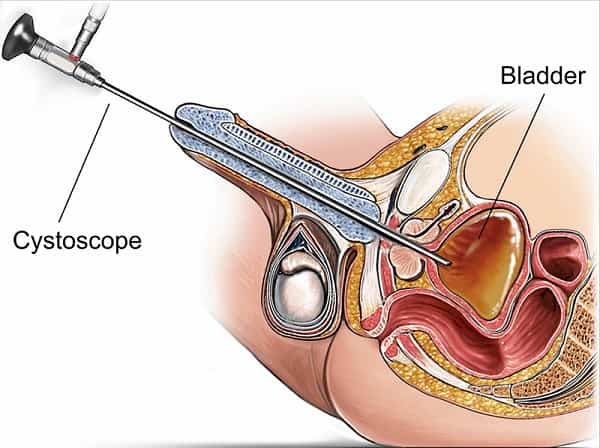Cystoscopy is a procedure used by urologists to inspect the urinary tract of their patients to diagnose and treat urinary tract infections. This procedure is carried out with the use of a medical device known as a cystoscope. It is an optical device with an eye on one side and a lens on the other. It provides the doctor with the ability to see via the urethra and bladder. The cystoscope is placed into the patient's bladder to perform the procedure.
Cost varies from Rs.20,000 to 35,000 for a cystoscopy test in India, based on a variety of criteria such as the location of the facility, the accreditations of the institution, the doctor's experience, and other considerations.

An internal bladder examination, known as cystoscopy, is performed with the help of a thin instrument known as a cystoscope to provide a view of the bladder's inside. This is a test that helps the doctor to check the lining of the urinary bladder as well as the urethra, which is the tube that transports urine from the body. Certain urological diseases can be investigated, monitored, or treated with the help of this test.
The following conditions will need the use of a cystoscopy procedure:
Cystoscopy is a straightforward treatment that can be completed as an outpatient. A general anesthetic or sedative can be used to execute the procedure. Sedation is utilized to ensure that the patient is awake but calm throughout the process and that there is no pain experienced. If general anesthesia is administered, the person will be sleeping throughout the examination.
The cystoscope, which is a hollow tube, will be inserted into the urethra by the doctor to reach the bladder. The procedure begins with the application of jelly to the urethral to numb the region & prevent pain whereas a cystoscope is introduced into the bladder.
Through the cystoscope lens, the doctor will be able to examine the lining & tissues of a bladder and urethra in more detail. The use of wide scope and surgical equipment is required if a tissue sample is to be obtained for a biopsy examination.
To expand the bladder, a sterile fluid will be injected into it. This provides the surgeon with a greater view of the bladder's inside, which is beneficial.
Q1. What To Do Prior To Cystoscopy Treatment?
Ans: By the doctor or examiner, you’ll be asked not to eat or drink anything, at least a few hours prior to the cystoscopy. You’ll be asked to urinate right before the procedure, and a sample of your urine will be taken for the UTI. If you are taking any medication, then you should consult it with your doctor, and should not take any blood thinning medications at least 24 prior to the procedure.
Q2. Are There Any Side Effects Of Cystoscopy Treatment?
Ans: In case you have any other medical condition, you should let your doctor know before he/she begins the procedure because you might be given anesthesia to relax and ease the process. Not just that, after the cystoscopy, it might be that you face bleeding issues or feel a burning sensation when urinating. However, if there is too much pain, and swelling, you should call and let your doctor know right away.
Q3. How Does The Aftercare Look Like On The Completion Of Cystoscopy?
Ans: If your case isn’t severe, you can expect to get discharged immediately after the cystoscopy is done, or it could be that doctors would keep you at the hospital for a minimum of 24 hours for monitoring. You will be advised not to have sexual intercourse, and rest for at least the whole day.